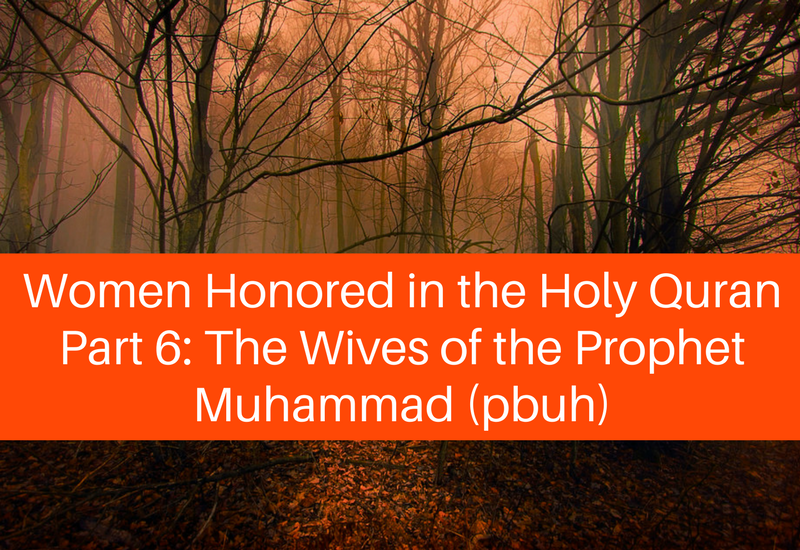Previous articles in this series highlighted two wives of the Prophet (pbuh): Aisha (ra) and Zaynab bint Jahsh (ra). This article discusses how the Prophet’s wives as a group are honored in the Holy Quran.
>> Understand the Quran in as little as 10 minutes/day. Click here to learn more
Verses of Honor
The wives of our beloved Prophet (pbuh) are honored with the title “Mothers of the Believers (Ummahat Al Mu’minin)” because of this verse from the Holy Quran:
“The Prophet is more protective towards the believers than they are themselves, while his wives are their mothers…” (33:6).
Allah (swt) says that the Prophet’s wives are not like other women:
“O wives of the Prophet, you are not like anyone among women. If you fear Allah, then do not be soft in speech [to men], lest he in whose heart is disease should covet, but speak with appropriate speech” (33:32).
Due to their high spiritual status, they are more accountable for their actions than the average Muslim woman, and they will also be rewarded more than the average Muslimah:
“O wives of the Prophet, whoever of you should commit a clear immorality – for her the punishment would be doubled two fold, and ever is that, for Allah, easy. And whoever of you devoutly obeys Allah and His Messenger and does righteousness – We will give her her reward twice; and We have prepared for her a noble provision (33:30-31).”
The Prophet’s wives are a part of his family and thus are honored with the title “Ahl al-Bayt” (“Family of the House”):
The majority of Islamic scholars agree that the following verse shows that the Prophet’s wives are included in the Ahl al-Bayt:
“And abide in your houses and do not display yourselves as [was] the display of the former times of ignorance. And establish prayer and give zakah and obey Allah and His Messenger. Allah intends only to remove from you the impurity [of sin], O people of the [Prophet’s] household, and to purify you with [extensive] purification (33:33).”
Muslims are required to love and respect all those in the Ahl al-Bayt, and we send peace and blessings on the Ahl al-Bayt in every salat that we do, in the second Tashahhud:
“O Allaah, send prayer upon Muhammad and upon the family of Muhammad, as You sent prayers upon the family of Ibraaheem; You are indeed Worthy of Praise, Full of Glory. And send blessings upon Muhammad and upon the family of Muhammad, as You sent blessings upon the family of Ibraaheem; You are indeed Worthy of Praise, Full of Glory.”
(Allaahumma salli ‘ala Muhammadin wa ‘ala aali Muhammadin kamaa salayta ‘ala aali Ibraaheem, innaka Hameedun Majeed, wa baarik ‘ala Muhammadin wa ‘ala aali Muhammadin kamaa baarakta ‘ala Ibraaheem, wa ‘ala aali Ibraaheem innaka Hameedun Majeed.)
Allah (swt) reminds the Prophet’s wives that they have been honored with verses of the Quran being revealed inside their own homes. They have also been honored with the “wisdom,” which refers to the Sunnah of the Prophet Muhammad (pbuh):
“And remember what is recited in your houses of the verses of Allah and wisdom. Indeed, Allah is ever Subtle and Acquainted [with all things]” (33:34).
One of the benefits of the Prophet (pbuh) having wives is that they were prolific narrators of hadiths.
Allah Honors Umm Salamah’s Question: Why Are Women Not Mentioned in the Quran?
Imam Ahmad recorded that Umm Salamah, may Allah be pleased with her, the wife of the Prophet said, “I said to the Prophet, ‘Why is it that we are not mentioned in the Qur’an as men are?’ Then one day without my realizing it, he was calling from the Minbar and I was combing my hair, so I tied my hair back then I went out to my chamber in my house, and I started listening out, and he was saying from the Minbar:(O people! Verily Allah says: (Verily, the Muslims: men and women, the believers: men and women…)) to the end of the Ayah.”
Here is the entire Quranic verse in which Allah responds to Umm Salamah’s question:
“Indeed, the Muslim men and Muslim women, the believing men and believing women, the obedient men and obedient women, the truthful men and truthful women, the patient men and patient women, the humble men and humble women, the charitable men and charitable women, the fasting men and fasting women, the men who guard their private parts and the women who do so, and the men who remember Allah often and the women who do so – for them Allah has prepared forgiveness and a great reward (33:35).”
Related Video: Yasmin Mogahed – Women In Islam




Leave a Reply